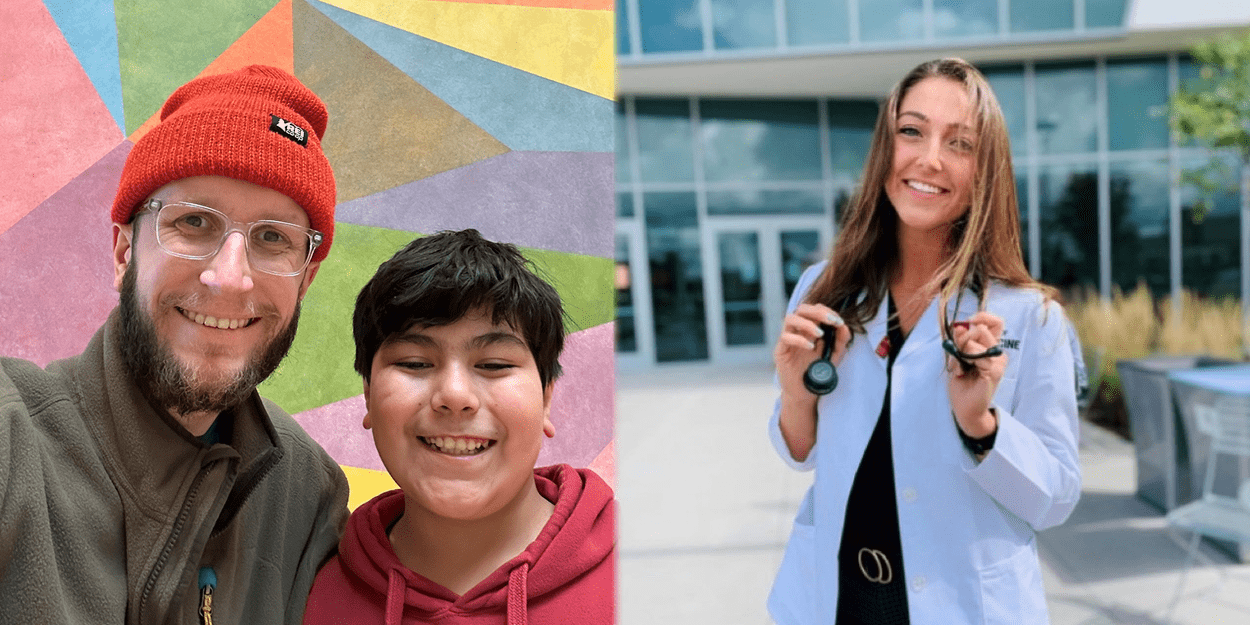
INPACT in Action
IU School of Medicine recruits and trains physicians to fill a stubborn shortage of primary care physicians in underserved areas across Indiana.
Bobby King May 27, 2025
FOR AARON WEBB, giving back to his community was something he learned in childhood. He was a Boy Scout, a bellringer for the Salvation Army at Christmas, and participated in numerous public service projects. In college, he worked as a counselor at a camp for kids with chronic illnesses.
For Olivia Carlton, it was her mother who emphasized that her children were supposed to be about the business of helping others. And she saw that spirit of caring for others around her, including the science teachers who fueled her interest in medicine.
Both Webb and Carlton, 2024 graduates of Indiana University School of Medicine and now first-year medical residents in IU programs, found their professional path to serving others by becoming primary care physicians — Webb as a pediatrician, Carlton as an internist.
In Indiana, a state which must boost its primary care physician workforce by 20% in the next five years just to keep up with patient needs, their career choices are not only welcome but something IU School of Medicine is eager to encourage.
Using a four-year, $15.4 million grant awarded in 2023, the school is aiming to prompt more of its graduates to pursue careers in family medicine, pediatrics, internal medicine and medicine/pediatrics. It’s also reaching out to students, like Webb and Carlton, who come from areas of the state where the shortage of primary care physicians is acute.
Known as INPACT, the grant awards up to $20,000 in scholarships toward a student’s fourth year of medical school if they are planning to enter a primary care residency program. Last year, 94 fourth-year students received the scholarships.
INPACT also aids efforts to recruit and support medical students from medically underserved areas of Indiana, especially in rural counties, which struggle to attract and retain physicians. Students from underserved areas tend to be the most willing to return and work there.
Other parts of the grant have been used to increase support for the school’s Master of Science in Medical Science program — an entryway for students who may have decided late, as undergraduates, that they were interested in medicine.
Bradley L. Allen, MD, PhD, interim executive associate dean for educational affairs at IU School of Medicine and a principal investigator on the INPACT grant, said primary care providers play a vital role in communities by being able to treat a broad range of conditions, promote community health and work to prevent disease.
“Primary care physicians can provide prompt care for acute illnesses and injuries in most cases but are also able to direct their patients to experts in specialty care when needed,” Allen said.
The shortage of primary care physicians is a national problem. The Health Resources and Services Administration, which funded the grant, says the current national shortage is 43,130 primary care physicians. Over the next decade, that deficit is expected to grow by almost 25,000.
Driving the shortage is as an aging population that will require more care, a significant number of physicians reaching retirement age themselves and the financial incentives that lead many medical students, often burdened with debt, to pursue specialties with higher pay.
In Indiana, 67 of the state’s 92 counties are designated as primary care health professional shortage areas, and parts of four more counties also have shortages.
IU School of Medicine has made efforts to address the issue by growing its rural medicine program at the Terre Haute campus and expanding its residency programs outside of Indianapolis.
Both Webb and Carlton, now MDs, are attuned to the culture of rural Indiana communities. Webb is a native of Huntington, Indiana, population 17,000, while Carlton grew up in a mostly rural area straddling Camby and Mooresville.
For Webb, the lure into pediatrics was the joy he took in working with and mentoring young people in Huntington elementary schools. He also recognized that pediatricians, who help both children and their parents navigate health challenges, were seen as trusted members of the community.
While he didn’t need coaxing into primary care, Webb acknowledges that the INPACT scholarship he received was a reward for going into a field that’s not as lucrative as other areas of medicine. “The scholarship seemed like a great opportunity to solidify some of my interests and to ease some of the financial burden around primary care,” he said.
For Carlton, the draw to internal medicine was her desire for patient contact and the opportunity to provide them with longitudinal care. “I love being around people,” she said. “I love to get to know them and their family members. I don’t want to see someone just once and then never again.”
Carlton said she never gave much thought to the financial rewards of various medical specialties — it was all about entering a career she loved, one that didn’t feel like a job. But just the same, she appreciates the help from the INPACT scholarship.
“It gives people support to go into fields that are necessary, that are vital to people’s health and that are going to offer them preventative medicine and longitudinal care.”
Meet two young physicians who benefited from INPACT scholarships. Visit bit.ly/IUSMINPACT.